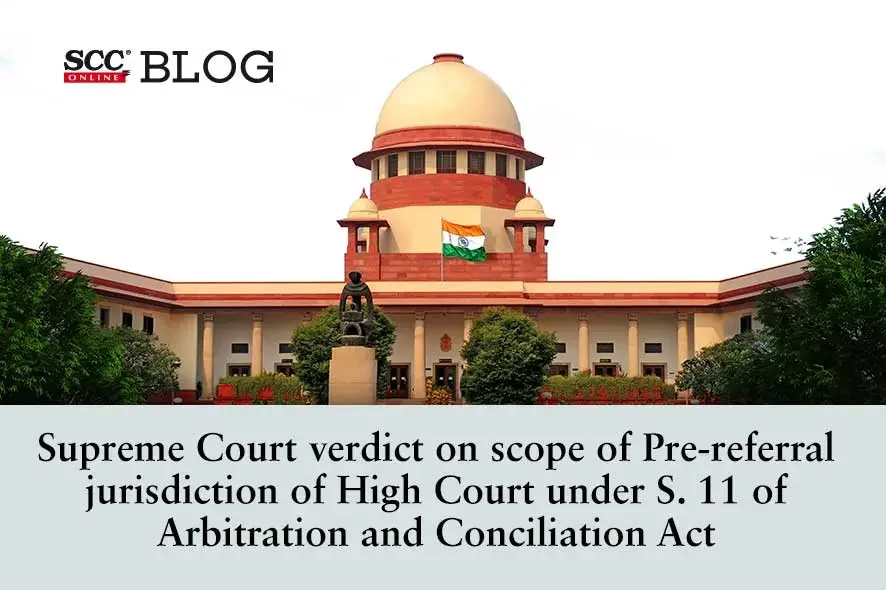Supreme Court: In an appeal against the decision of Delhi High Court, wherein the Court allowed the respondent’s application under Section 11(6) of the Arbitration and Conciliation Act, 1996 for the constitution of an Arbitral Tribunal, the Division Bench of Dr. DY Chandrachud, C.J. and P.S. Narasimha*, J. held that the High Court has committed an error in allowing the application under Section 11(6) of the Act. It ought to have examined the issue of the final settlement of disputes in the context of the principles laid down in Vidya Drolia v. Durga Trading Corpn., (2019) 20 SCC 406
It is the case of the appellant/ National Thermal Power Corporation Ltd. (‘NTPC’) that there were no subsisting disputes between the parties in view of the settlement agreement and that the application for arbitration is an afterthought and abuse of the process.
In the case at hand, NTPC and respondent entered a contract for “Installation Services for Station Piping Package for Simhadri Super Thermal Power Project”. The whole dispute revolves around the solitary act of the NTPC, in not returning the Bank Guarantees despite the successful completion of work.
In the present case, the Court was concerned with the pre-referral jurisdiction of the High Court under Section 11 of the Act and examined the limited scope within which an application under Section 11(6)12 of the Act has to be considered.
The Court said that the position of law with respect to the pre-referral jurisdiction, as it existed before the advent of Section 11(6A) in the Act, was based on a well-articulated principle formulated in National Insurance Co. Ltd. v. Boghara Polyfab (P) Ltd., (2009) 1 SCC 267, wherein it was held that the issue of non-arbitrability of a dispute will have to be examined by the court in cases where accord and discharge of the contract is alleged.
The Court further said that in a legislative response to these precedents, through the Arbitration and Conciliation (Amendment) Act 2015, sub-section (6A) was added to Section 11 of the Act.
The Court took note of Duro Felguera, S.A. v. Gangavaram Port Ltd., (2017) 9 SCC 729, wherein it was held that post the 2015 Amendments, the jurisdiction of the court under Section 11(6) of the Act is limited to examining whether an arbitration agreement exists between the parties – “nothing more, nothing less”. However, in United India Insurance Co. Ltd. v. Antique Art Exports (P) Ltd., (2019) 5 SCC 362, this Court had nevertheless accepted an objection of ‘accord and satisfaction’ in opposition to an application for reference to arbitration. But this position of law was overruled in Mayavati Trading (P) Ltd. v. Pradyuat Deb Burman, (2019) 8 SCC 714.
Placing reliance on Vidya Drolia (supra), wherein it was held that “the arbitral tribunal is the preferred first authority to determine and decide all questions of non-arbitrability. As an exception to the rule, and rarely as a demurrer, the referral court may reject claims which are manifestly and ex-facie non-arbitrable.” The Court said that the limited scope of judicial scrutiny at the pre-referral stage is navigated through the test of a ‘prima facie review’, which means that “the legal order needs a right balance between avoiding arbitration obstructing tactics at referral stage and protecting parties from being forced to arbitrate when the matter is clearly non-arbitrable. Accordingly, when it appears that prima facie review would be inconclusive, or on consideration inadequate as it requires detailed examination, the matter should be left for final determination by the Arbitral Tribunal selected by the parties by consent”1.
Further, the Court said that, the arbitral tribunal is the preferred first authority to determine and decide all questions of non-arbitrability.
The Court said that the above-referred precedents crystallise the position of law that the pre-referral jurisdiction of the courts under Section 11(6) of the Act is very narrow and inheres two inquiries:
- The primary inquiry is about the existence and the validity of an arbitration agreement, which also includes an inquiry as to the parties to the agreement and the applicant’s privity to the said agreement. These are matters which require a thorough examination by the referral Court.
-
The secondary inquiry that may arise at the reference stage itself is with respect to the non-arbitrability of the dispute.
The Court noted that almost three weeks after the release of the Bank Guarantees, a letter of repudiation was issued by the respondent about two months after the Settlement Agreement was executed and in fact during the subsistence of the writ petition. After reaping the benefits of the settlement agreement, the writ petition was withdrawn. It is thereafter that the present application under Section 11(6) of the Act was filed. The sequence of events led the Court to conclude that the letter of repudiation was issued only to wriggle out of the terms of the Settlement Agreement. Thus, the claims submitted to arbitration were raised as an afterthought. Further, respondent’s allegations of coercion and economic duress in the execution of the Settlement Agreement lack bona fide. Thus, they are liable to be knocked down as ex facie frivolous and untenable.
The Court opined that this is a case where the High Court should have exercised the prima facie test to screen and strike down the ex-facie meritless and dishonest litigation. These are the kinds of cases where the High Court should exercise the restricted and limited review to check and protect parties from being forced to arbitrate.
[NTPC Ltd. v. SPML Infra Ltd., 2023 SCC OnLine SC 389, decided on 10-04- 2023]
*Judgment Authored by: Justice PS Narasimha
1. Vidya Drolia v. Durga Trading Corpn., (2019) 20 SCC 406






